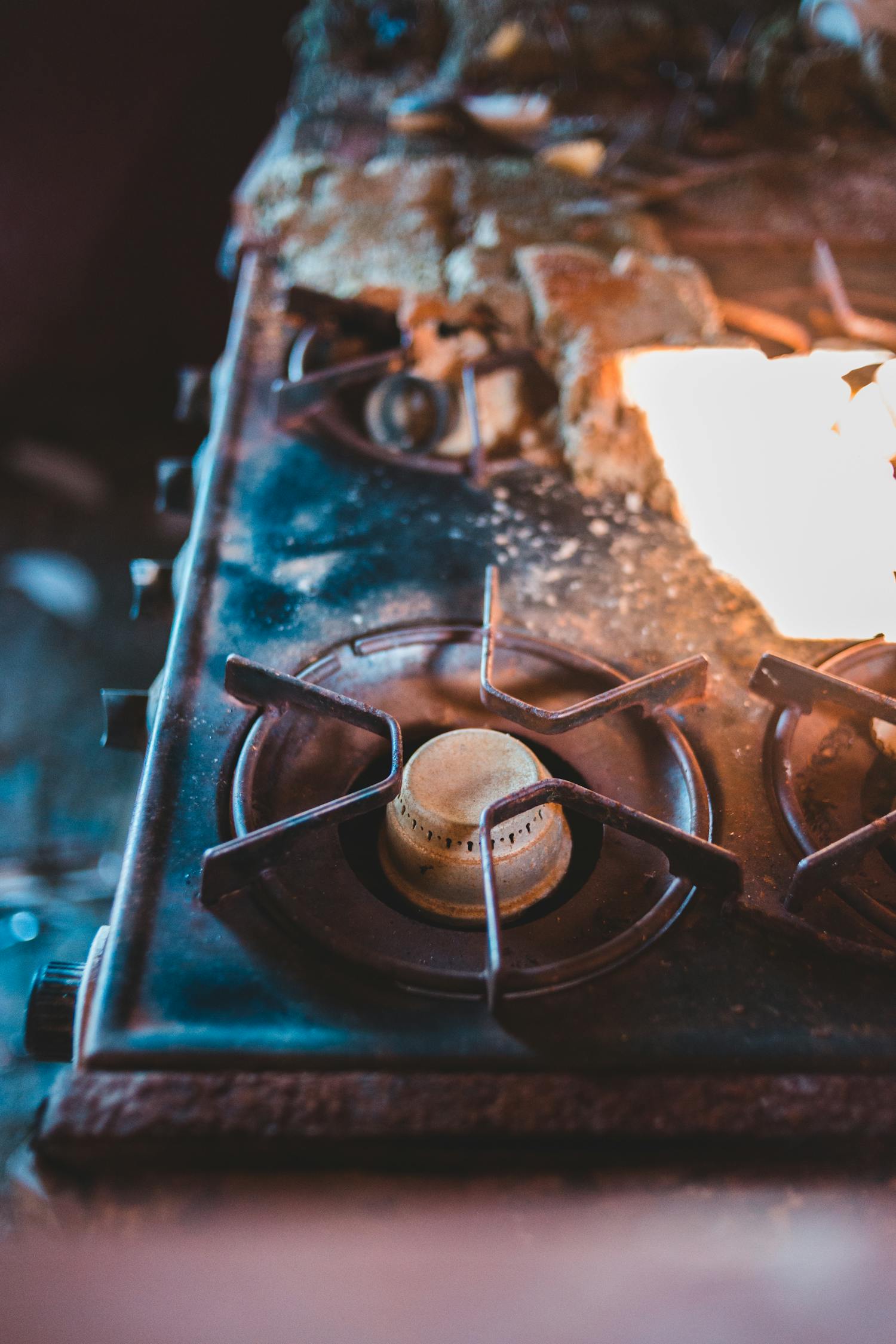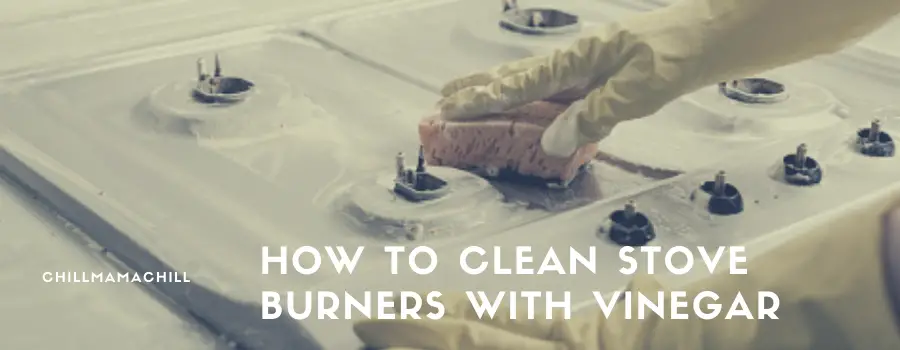Did you know that you can use everyday household products to restore your stovetop to its days of glory? Vinegar has been used through time to get rid of the toughest build-up on any burner. So, how can you clean stove burners with vinegar?.
Vinegar is the ultimate cleanser. It is used to clean stove burners naturally by loosening streaks and stains.
Clean burners perform more efficiently and consume less energy. Moreover, dirt on your stovetop is not only unsightly but can also be a potential food contamination hazard. Use vinegar to keep them free of grit and grime. Read on to find out how you can maintain your burner’s sparkle with vinegar.
Benefits of Using Vinegar to Clean Stove Burners
However, before we delve deeper into the process, why do you think vinegar is championed as the ultimate natural cleanser? It turns out vinegar is made up primarily of acetic acid, which gives it cleansing properties.

White vinegar, in particular, is recommended for cleaning because it has a lower pH. All other kinds of vinegar, such as balsamic, rice vinegar, and apple cider, are manufactured via a natural process – double fermentation. On the other hand, white vinegar stands out because it is also made industrially from laboratory-produced acetic acid making it more acidic.
Due to vinegar’s acidity, it helps to dissolve some unpleasant deposits. It can dissolve soap scum, brine stains from hard water, and the residue left behind when removing a sticker.
Gentle on Surfaces
Compared to commercial cleaning products that purport to eliminate grease on burners, vinegar does not corrode stovetops. Industrial cleaners often contain chemicals that may corrode the stove after long-term use.
Readily Available
Almost every household in the U.S has some type of vinegar in their homes. It is prevalent due to its versatile application in the kitchen. You can find various brands of vinegar on almost any store’s shelf.
Safe to Use
Vinegar is hypoallergenic and vegan. This makes it safe to use by anyone. However, due to the strong acidity, ensure you dilute the vinegar as per instructions to avoid your skin drying out.
Environmental Friendly
Vinegar is biodegradable and non-toxic, making it the ultimate eco-friendly multipurpose cleaning solution. It is not only tough on stains but also good for the environment.
However, some research indicates that petrochemicals produced as a by-product during the industrial manufacture of white vinegar are harmful to the environment. Especially when the effluent is dumped into water bodies affecting aquatic life.
Guide on How to Clean Stove Burners with Vinegar
From overflowing pots of simmering stews to drops of grease that jump off the frying pan, your stovetop could be harboring the remnants of every meal. Some people dread cleaning cooktops because of the amount of work involved and will put it off to later. Others prefer the most marketed commercial cleaning product that requires the least elbow grease.
However, a select few are transitioning to green, sustainable solutions – thus, the growing popularity of vinegar as a cleaning product. Read on to see how to clean stove burners with vinegar (and a bit of baking soda).
Cleaning the Burner Heads and Caps
For this, you’re going to need vinegar, some baking soda, water, and a spray bottle.
Step 1
- Fill a spray bottle with half part water and half part vinegar.
- Spray the burner caps and heads evenly with the mixture.
- Let them rest for 15 – 30 minutes undisturbed.
Step 2
- Make a paste with the water and baking soda.
- To the burner heads and caps, spread a thin layer of the paste.
- Wait 15-30 minutes.
- Remove any build-up with a toothbrush or scrub brush.
- Rinse and dry.
- Reassemble.
Cleaning the Grates
To wash the grates, make sure you have vinegar, water, baking soda, and a shallow-bottomed pan.
Step 1
- Remove the burner caps, grates, and burner heads. Ensure the burner is not hot.
- Fill a small pan halfway with water and fill the remaining half with vinegar.
- Place the grates in the pan. Make sure they are completely immersed in the solution.
- Soak for half an hour, then remove and rinse them.
Step 2
- Make a paste from water and baking soda.
- Apply the paste to the grates and let them sit for 15-30 minutes.
- Scrape off the gunk with a scrub brush. A hard-bristled toothbrush may suffice.
- Rinse thoroughly in clean water and pat the grates dry (you may also air dry them).
How Often Should I Clean Stove Burners?
So how do I know it’s time to clean my stove burners? It all depends on how often you use them. Spills are a common occurrence of cooking, meaning that if you cook regularly, you may have to clean more frequently.
Typically, a deep clean once monthly is adequate. But be on the lookout for signs that indicate clogging or dirt build-up., such as:
- Burner emitting a yellow flame
- Irregular flame
- A section of the burner doesn’t produce a flame
To increase the period between two cleanings, try to wipe any spills as they happen.
Which Vinegar is Best For Cleaning?
Typically, the higher the amount of acetic acid, the more effective the vinegar as a cleanser. This makes white vinegar a universally preferred choice. Nevertheless, some people have an aversion to white vinegar due to its strong smell, while others claim it affects their skin even when properly diluted.
Apple cider vinegar, a mild vinegar, is an excellent alternative. When mixed in a 1:1 ratio with water, apple cider vinegar and water solution make a formidable household cleaner.
The Bottom Line
You probably have a bottle of some vinegar sitting in your kitchen, yet you’re constantly stressed out because the commercial cleaner you purchased has failed to get rid of the stains on your burner. If you’ve been wondering how to clean stove burners with vinegar, you have all the answers. Whether used on its own or in combination with other products, eco-friendly vinegar holds the trophy for cleaning grease and grime from stove burners.

I’m Cathrine and I’m a 39-year-old mother of 3 from Utica, New York. And I’m extremely happy you’ve come to visit my hide-out on the web. Here I post about everything related to family-life and usually it will involve babies and lessons I’ve learned over the years from experts, friends, and my own mistakes. So hopefully you will find what i write fun and informational!

